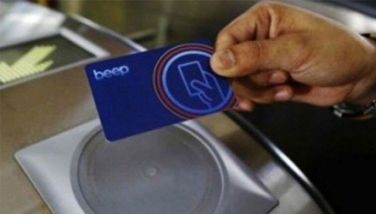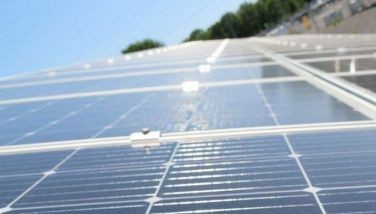Dennis Uy’s Malampaya deal: Good, bad or ugly?
(First of three parts)
Dennis Ang Uy, founder of oil player Phoenix Petroleum Corp., is not a rookie businessman.
A native of Davao City, Uy is the man behind Phoenix Petroleum, at times touted as the fourth biggest oil firm in the country after the Big Three – Petron Corp., Pilipinas Shell Petroleum Corp. and Chevron Philippines. Phoenix was born in 2005 and disrupted key provincial markets where the Big Three were dominant.
In the Manila business scene, Uy, 48, is relatively a new kid on the block but he rose to prominence when President Duterte came into power in 2016. His holding company, Udenna – a word play on Dennis – became more aggressive with its expansion, buying companies left and right, from the 2GO Group to Conti's Bakeshop and many more.
Crown jewel
But his biggest and most controversial acquisition to date is that of shares in the consortium operating the country‘s energy crown jewel, the $4.5-billion Malampaya Deep Water Gas-to-Power Project in offshore Palawan, a major source of natural gas that powers more than 30 percent of Luzon‘s electricity requirements.
Private citizens, lawmakers, past and present energy officials and executives of privately owned oil
companies have raised concerns over Uy‘s entry into Malampaya.
They are questioning Udenna’s financial capability and its lack of experience in oil exploration.
On the government side, they are likewise questioning what they perceive as an undue advantage extended by the Department of Energy (DOE) to Uy.
To understand the controversy surrounding the deal, one has to look into Uy’s profile and track record.
Who is Dennis Uy?
Uy, a native of Davao City, belongs to the third generation of the Uy family whose ancestors Ega Uy and wife Tao Sui Eng were migrants from Fujian, China who settled in Davao as merchants.
He is the eldest of four siblings in a family of businessmen. His grandparents owned a shop selling fishing equipment and bread; his parents operated a copra business.
He was exposed to the family businesses at an early age.
While in college – he obtained a Bachelor of Science in Business Management at the De La Salle University in Manila in 1993 – he started trading in the stock market, raising some money to start his own business after he graduated.
Aside from Go, Uy knew Duterte, and supported him, even when he was still mayor.
When Duterte ran for the presidency, Uy was among his biggest campaign donors. Duterte appointed him as his presidential adviser on sports.
Soft-spoken and described by his staff as the shy type, Uy seems a simple man although he rides a sleek, black Lexus, among his other cars; sports a multi-million-peso watch on his wrist; has a sprawling penthouse unit in a towering condominium along Ayala Avenue, aside from a house in an exclusive gated village and frequents one of the most expensive luxury resorts in the Philippines when he wants to take a break.
Manila tycoons attribute Uy’s meteoric rise to his closeness with Duterte.
Their friendship is not a secret. In fact, the only time President Duterte set foot on the Philippine Stock Exchange trading floor as president was in July 2017 when he graced the 10th anniversary of Uy’s Phoenix Petroleum as a listed company.
Uy does not downplay his close ties with the President but dismisses insinuations that his business grew because of it.
He once said that success in life has a lot to do with timing.
“Timing, timing lang. That is life. It’s destiny,” he said in earlier interviews.
(The STAR sent requests to Uy’s camp to interview him on the Malampaya issue but no interview happened as of this writing).
A lot of his expansion happened in 2017 but he previously said this was because he had confidence in the country and in Duterte’s leadership and thus he was willing to invest.
By the end of 2017, Udenna had investments in around 55 companies from less than half as of end-2015. Of the 55, at least 10 were incorporated or commenced operations in 2017.
That year, Udenna’s net income grew to a whopping P4.3 billion from just P780 million in 2016, an increase of more than five times.
It was in 2017 when he gained entry into the 2GO Group, the logistics and shipping company.He also obtained a license from gaming regulator Philippine Amusement and Gaming Corp. to develop a $300 million casino in Cebu, and acquired Clark Global City from Global Gateway Development Corp.
In 2018, he acquired Conti’s Bakeshop and Restaurant from the Conti family and also invested in the country’s third telco through Dito Telecommunity.
His was no doubt an aggressive expansion and a phenomenal rise in the business community, surpassing the usual deals by the bigger conglomerates in the country.
Most recently, his F2 Logistics also bagged a P535.9 million contract from the Commission on Elections for the distribution of ballots, vote-counting machines, and other election paraphernalia for the 2022 elections.
Debt pile
As his business empire grew so did his debt pile, which is normal for any aggressive company.
As of end-2017, Udenna had interest-bearing loans of P85.8 billion, up 200 percent from just P28.4 billion the previous year.
Uy’s camp repeatedly said this was manageable.
In 2019, Udenna’s debt-to-equity ratio improved to 2.7 percent from 3.09 percent in 2018.
But things became problematic – not only for Udenna but all businesses in the country, whether big or small – when COVID-19 struck in late 2019 and battered the economy.
He started selling assets to manage his debt and cash flow.
He sold his stake in 2GO and put some of Phoenix Petroleum’s assets on the auction block to ”manage debt and fund activities.”
It is against this backdrop that critics are questioning the entry of Uy’s Udenna in Malampaya – the first part of which happened before COVID-19 struck – and the Department of Energy’s move to allow it.
Before Udenna came into the picture, the Malampaya Consortium was composed of Shell Philippines Exploration B.V. (SPEX) with a 45 percent stake, Chevron Malampaya with another 45 percent and Philippine National Exploration Corp. (PNOC) with a 10 percent stake.
Chevron decided to sell its 45 percent stake to Udenna in 2019, a deal that was sealed in February 2020.
In May 2020, Shell likewise announced that it had signed an agreement with Udenna for the sale of its 45 percent stake.
For both transactions, Uy obtained loans from foreign banks namely ING Bank, Deutsche Bank and ANZ or the Australian and New Zealand Banking Group.
Shell’s stake cost at least $380 million while Chevron’s stake amounted to $565 million.
It was not the first time a member of the Malampaya Consortium sold its stake.
In 1999, Shell and Occidental Petroleum were partners. Shell then swapped assets with Occidental Petroleum, a source said. Shell ended with a 90 percent of the project and then Shell sold 45 percent to Texaco, which later on merged with Chevron.
But for the first time since Malampaya commenced commercial operations in 2002, the operations of Malampaya went to the hands of a Filipino company, which is Udenna. It was practically taken back from multinational giants.
Udenna popped the champagne bottles and sources said Filipinos working at the rig welcomed the development.
“We see immense potential in natural gas, the fuel of the future, and we are optimistic and excited to bring its full benefits to Filipinos,” Uy said early this year after the deal with Chevron was sealed.
“Taking a long view, this new milestone moves us closer to Udenna’s vision of being an indispensable partner in nation building. We look forward to working with our joint venture partners, Shell and PNOC-EC, and Malampaya’s key stakeholders, including the Philippine Department of Energy, to ensure that Malampaya continues to play an important role in developing a sustainable clean energy business in the Philippines,” Uy added.
But questions would emerge months after.
(To be continued)
- Latest
- Trending






























